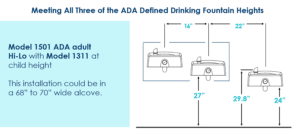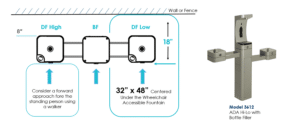Hydration is a Fundamental Right
The ADA, enacted in 1990, aims to ensure equal opportunities and access for individuals with disabilities. While the focus of the ADA is primarily on architectural accessibility, it also extends to facilities providing services to the public, including workplaces. Recognizing the fundamental nature of hydration, ADA compliance necessitates the provision of accessible drinking water for all individuals, irrespective of their abilities.

Importance of Hydration in Safety Programs
Hydration is not just a matter of personal comfort; it directly impacts cognitive and physical performance. In workplaces, where safety is paramount, ensuring employees have easy access to water is a crucial aspect of any comprehensive safety program. Dehydration can lead to fatigue, reduced concentration, and impaired decision-making—factors that pose significant risks in any work environment.
Moreover, incorporating hydration into safety programs aligns with the comprehensive approach to employee well-being. Healthy, hydrated employees are more alert, focused, and better equipped to handle the demands of their roles, contributing to a safer working environment.
Meeting ADA Requirements: Beyond Compliance
While ADA requirements mandate accessible drinking fountains, organizations can go above and beyond mere compliance by embracing modern, hygienic solutions. Traditional drinking fountains may present challenges for individuals with mobility impairments, making it essential to explore alternatives that cater to diverse needs.
Enter bottle fillers – a contemporary, inclusive solution that not only meets ADA standards but also offers a hygienic and environmentally friendly approach to hydration. Bottle fillers provide a touchless experience, reducing the risk of contamination and ensuring a sanitary water source for everyone. These innovative solutions contribute to creating an inclusive environment by accommodating individuals with disabilities while promoting sustainability through a reduction in single-use plastic.
The Role of Bottle Fillers in ADA-Compliant Facilities
When integrating bottle fillers into facilities, organizations are not only enhancing accessibility but also embracing a more modern and efficient approach to hydration. ADA-compliant bottle fillers are designed with features such as a lower spout height and accessible controls, ensuring that individuals with disabilities can easily and comfortably use them.
Additionally, bottle fillers encourage a more proactive approach to hydration. Employees can easily refill their water bottles throughout the day, promoting a culture of well-being and self-care. This not only aligns with ADA requirements but also fosters a positive workplace environment that values the health and inclusivity of all employees.
In conclusion, recognizing the importance of hydration in safety programs is a pivotal step toward creating a workplace that prioritizes employee well-being and inclusivity. By embracing ADA-compliant solutions such as drinking fountains and, more innovatively, bottle fillers, organizations can ensure that all employees, regardless of ability, have convenient access to a clean and safe water source. Integrating these hygienic solutions not only meets regulatory standards but also contributes to a workplace culture that values health, safety, and the diverse needs of its workforce.

REGISTER FOR OUR UPCOMING WEBINARS
Explore NowExplore our Hydration products
See More


